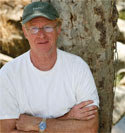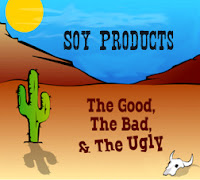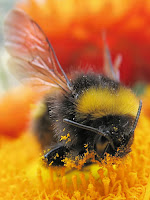 This is it! The final installment of The Omnivore's Dilemma book club.
This is it! The final installment of The Omnivore's Dilemma book club.Chapter 18: Hunting - The Meat I found it interesting the description that Michael Pollan gave of the adrenaline rush of hunting an animal. Having never hunted before I can't quite relate. I think the closest I can get to it is fond memories of playing hide and seek, where your senses are heightened and the anticipation is unbearable. Do you believe that humans still hold an evolutionary throwback to this hunting physiology? If you have hunted before, have you experienced this as well?
 Chapter 19: Gathering - The Fungi I live in the land of the fungi, yet few people I know are proficient in hunting mushrooms. It's something that we have wanted to do for a while, but just never got around to it. The closest I've gotten to mushroom hunting was when I was wrapping our Dogwood with Christmas tree lights last December and spied this giant fella. I still, to this day, don't really know what the heck it is. Anyone have any ideas? And, no, I didn't eat it. Although it smelled wonderful and I was tempted.
Chapter 19: Gathering - The Fungi I live in the land of the fungi, yet few people I know are proficient in hunting mushrooms. It's something that we have wanted to do for a while, but just never got around to it. The closest I've gotten to mushroom hunting was when I was wrapping our Dogwood with Christmas tree lights last December and spied this giant fella. I still, to this day, don't really know what the heck it is. Anyone have any ideas? And, no, I didn't eat it. Although it smelled wonderful and I was tempted.Chapter 20: The Perfect Meal In the spirit of Local Food Month, I'd like to propose a meal similar to the one Michael Pollan enjoyed in this final chapter. The rules are a little looser than his, but the concept is the same - get to know intimately where all the food comes from that makes up one meal. Think of it as an über-local meal.
Here are the rules for "The Perfect Meal":
1. Everything on the menu must have been hunted/fished, gathered (including U-Pick), or grown by you
2. Everything must be made from scratch (this includes pasta, bread, etc.)
3. The menu should feature at least one representative of each edible kingdom: animal (vegetarians can skip this one), vegetable and fungus (only if still available and, since I don't want to kill anyone, just use local mushrooms)
4. Everything served must be in season and fresh
5. You have to cook the meal yourself
6. You have to invite at least a few guests to share this meal with you, preferably those that have helped you in acquiring the foods
You have a couple weeks to plan and work on this one. I'll have you post pictures and a report of this "Perfect Meal" by August 20th. I'll do a follow-up post in the intervening time.
------------------------------------------
Also, just as a head's up, I will doing a book giveaway of my relatively pristine hardbound copy of The Omnivore's Dilemma. So, if you don't already own a copy and would like one, stay tuned for this Friday (7/27) when I commence the giveaway.


 Based on the
Based on the 











 You can thank Leigh for her
You can thank Leigh for her 













